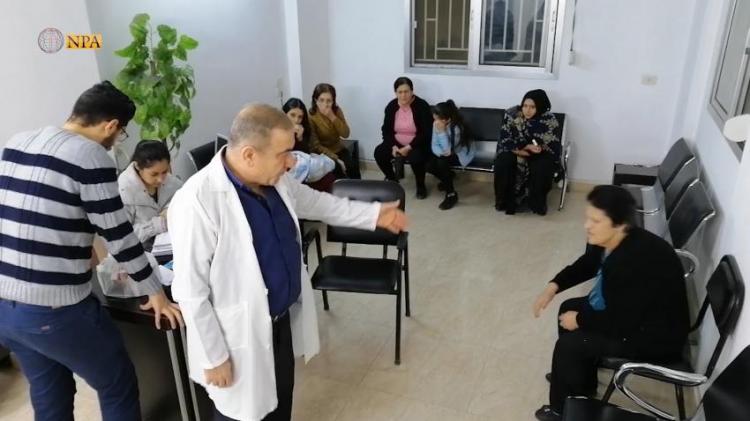Medical clinic in Qamishli provides free medical services to IDPs
Qamishli- North-Press Agency
Reem Chamoun
Humanitarian initiatives have recently increased in north-eastern Syria, to help the latest wave of displaced people from the areas of Sere-Kaniye (Ras al-Ain), Tal Abyad (Gre Spi) and Tal Tamr who have left their homes, as a result of the ongoing Turkish military invasion in the area. Some doctors in the city of Qamishli have taken an initiative to treat the people of the affected areas free of charge in their own clinics, while some of them within the free medical clinic of the Assyrian Society for Aid and Development.
A doctor of the free medical clinic, Surgeon Furat Maqdisi told North-Press, that the clinic has been there for 8 years, pointing out that at the beginning they were only three doctors, treating patients and distributing medicines to them as needed, noting that the medicines were donated from churches. He added that they are diagnosing patients from all of the components of the region.
Dr. Maqdisi said that the number of patients visiting the clinic has recently increased due to the increased number of displaced people in the area, from Ras al-Ain, Tal Abyad and Tal Tamr.
Regarding the cases that visit the medical clinic, Dr. Maqdisi clarified that most of the cases in the clinic are the ones of infections, internal diseases and some cases of infections and diarrhea, in addition to internal gynecology, chronic diseases and minor surgical cases. According to Dr. Maqdisi, shortly after, the Caritas Foundation of the Council of Churches attempted to assist the clinic by providing more drugs and some equipment that allowed the expansion of the clinic and the multiplicity of specializations.
For his part, Yacoub Gharibo, the secretary general of the Assyrian Association for Aid and Development, told North-Press that the association distributed 30 food baskets in the town of Derbasiya by the local cleric, and distributed about 125 baskets in Tirbe-Spi (Qahtaniya), Including IDPs who were in a shelter inside the town. Mr. Gharibo noted that the free medical clinic distribute medicines every three months, especially for people with chronic diseases, regardless of their ethnicity, religious or sectarian affiliation.

